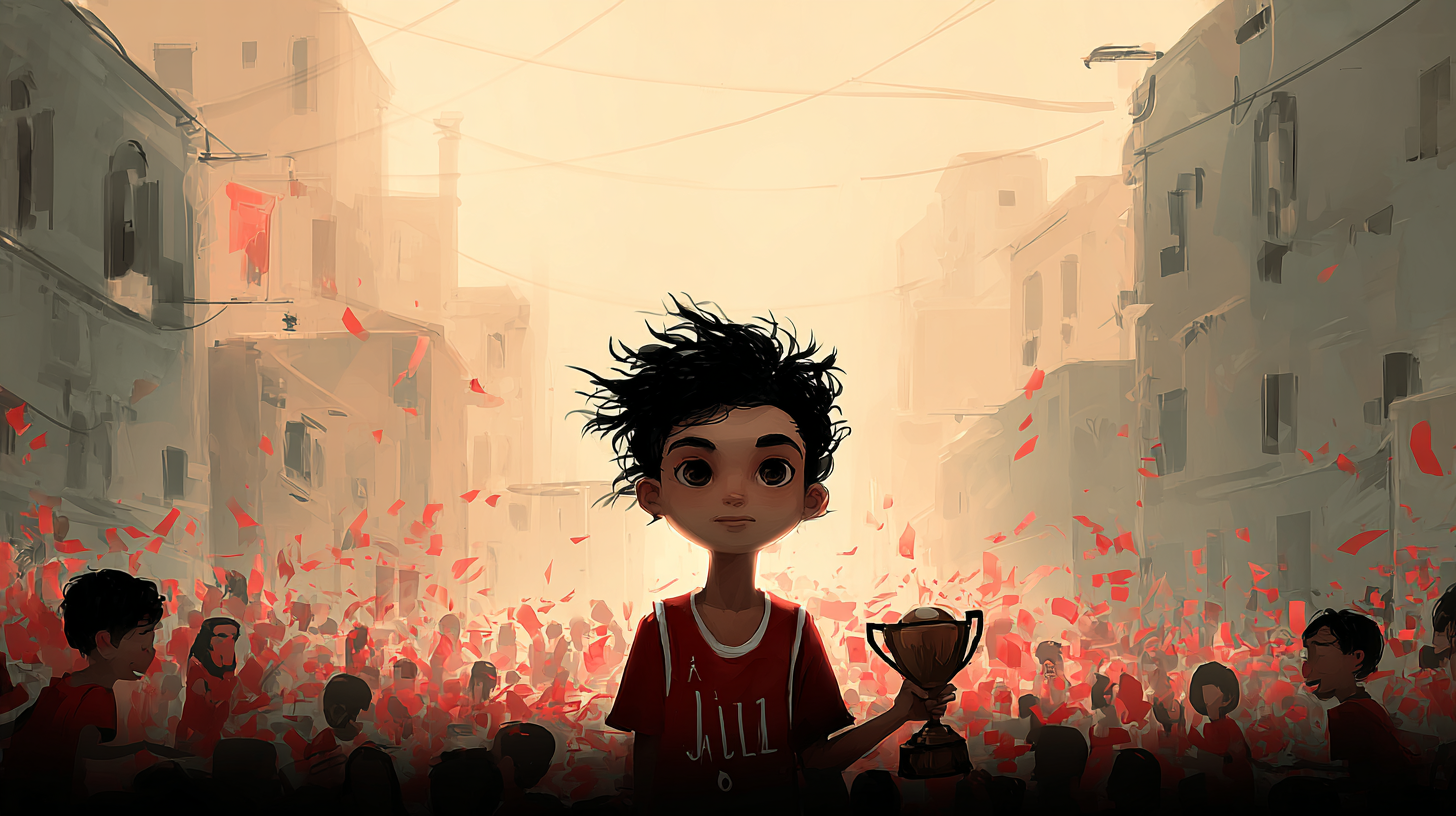“Champion” means a winner or someone who strongly supports a cause.
「champion」は試合の優勝者や、ある考えや人を強く守る人を表す。
以下は英単語 “champion” に関するストーリー型学習コンテンツです。まずは大枠の意味を理解して最後の文章で確認しましょう。
主な意味(main meaning)
| 品詞 | 意味 | 発音 | 例文 |
|---|---|---|---|
| 名詞 | 勝者、優勝者 | /ˈtʃæm.pi.ən/ | She is the champion of the tennis tournament. |
| 名詞 | 支持者、擁護者 | /ˈtʃæm.pi.ən/ | He is a champion of human rights. |
| 動詞 | ~を擁護する、支持する | /ˈtʃæm.pi.ən/ | She champions the cause of education for all children. |
語源(etymology)
「champion」はラテン語 campio(戦う者、闘士)に由来し、「戦いの場で勝ち取る者」「守る人」というイメージを持つ。
類義語(synonyms)
| 類義語 | 例文 |
|---|---|
| winner | She became the winner of the local contest. |
| victor | The victor of the battle was celebrated by his friends. |
| defender | He acted as a defender of free speech. |
| supporter | She is a strong supporter of the new policy. |
| advocate | He is an advocate for environmental protection. |
反義語(antonyms)
| 反義語 | 例文 |
|---|---|
| loser | He was disappointed to be the loser in the match. |
| opponent | The opponent argued against the new law. |
コロケーション(collocations)
| コロケーション | 例文 |
|---|---|
| world champion | She is the world champion in swimming. |
| defending champion | He returned as the defending champion this year. |
| champion of justice | She became known as a champion of justice. |
| national champion | He was named the national champion in judo. |
| to champion a cause | They worked to champion a cause for better schools. |
2項表現(binomials)
| 2項表現 | 例文 |
|---|---|
| win and lose | In sports, you sometimes win and lose. |
| rights and justice | He fought for rights and justice. |
英語ストーリー(english story)
Tom worked at a community center in his town. The center organized many events for young people, including sports tournaments. One day, they held a big basketball competition. Everyone was excited because the winner would be called the champion of the town.
Tom’s team practiced hard. They wanted to be the winners of the tournament, but they knew it was not only about victory. Their coach often said, “In sports, you sometimes win and lose, but what matters is teamwork.”
The final game was very close. At last, Tom’s team won by just one point. The crowd cheered, “You are the champions!” Tom felt proud, but he also thought about the other team, who became the losers this time. He went to shake hands with his opponents, respecting their hard effort.
After the game, the director of the center gave a speech. He said, “Sports are not only about finding a world champion or a national champion. We must also champion a cause. For example, we can use sports to bring young people together and to teach them about rights and justice.”
Tom realized that being a defender of good values was as important as being a victor in a match. He decided he wanted to become not only a strong player but also a supporter and an advocate for fairness in his community. From that day, he promised to become a champion of justice in both sports and daily life.
和訳
トムは町のコミュニティセンターで働いていた。そのセンターは若者のために多くのイベントを開き、スポーツ大会もあった。ある日、大きなバスケットボールの大会が開かれた。優勝者は町の**champion(優勝者)**と呼ばれることになっていた。
トムのチームは一生懸命練習した。**winner(勝者)になりたかったが、勝つことだけが大事ではないと知っていた。コーチはよくこう言った。「スポーツではwin and lose(勝ったり負けたり)**するが、大切なのはチームワークだ。」
決勝戦はとても接戦だった。最後に、トムのチームが1点差で勝った。観客は「君たちが**champions(優勝者たち)だ!」と歓声を上げた。トムは誇らしかったが、今回losers(敗者)となった相手チームのことも考えた。彼はopponents(相手)**に敬意を表して握手をした。
試合後、センターの館長がスピーチをした。「スポーツは**world champion(世界チャンピオン)やnational champion(全国チャンピオン)を決めるだけではありません。私たちはto champion a cause(ある大義を支持する)**ことも大切です。例えば、スポーツを通じて若者をつなげ、**rights and justice(権利と正義)**を教えることができます。」
トムは、良い価値観の**defender(守る人)になることが、試合のvictor(勝者)になるのと同じくらい大切だと気づいた。彼は強い選手になるだけでなく、コミュニティで公平さを守るsupporter(支持者)やadvocate(擁護者)になろうと思った。その日から彼は、スポーツと日常生活の両方でchampion of justice(正義のチャンピオン)**になることを誓った。
Q&A
Q: “champion” と “winner” はどう違いますか?
A: “winner” は単純に「勝った人」という意味で、ゲームやくじなど小さな勝負にも使えます。一方、”champion” は大会や大きな競技で一番になった人を指すことが多く、名誉や称号を強く感じさせます。
Q: “champion” と “victor” の違いは?
A: “victor” は「勝利者」という少し堅い表現で、戦いや競技に勝った人を指します。”champion” は「勝者」であるだけでなく「称えられる存在」というニュアンスがあり、日常会話でもよく使われます。
Q: “champion” と “defender” の違いは?
A: “defender” は「守る人」という意味で、サッカーなどのポジション名にも使われます。また考えや権利を守る人を表すこともあります。”champion” も「擁護者」という意味を持ちますが、ただ守るだけでなく積極的に推し進めるニュアンスがあります。
Q: “champion” と “supporter” の違いは?
A: “supporter” は「応援する人」「支える人」という意味で、スタジアムで声援を送るファンなども含みます。”champion” は応援に加えて「強く主張し行動する人」という力強さがあります。
Q: “champion” と “advocate” の違いは?
A: “advocate” は特定の権利や考えを「言葉で強く訴える人」を指します。弁護士や活動家のように社会問題に使われることが多いです。”champion” は必ずしも専門家でなくても、熱心に支援する人全般に使えます。
Q: “champion” と “loser” はどう違いますか?
A: “loser” は「負けた人」で、勝負に勝てなかったことを表します。反対に “champion” は「勝った人」や「一番の人」を意味します。
Q: “champion” と “opponent” の違いは?
A: “opponent” は「対戦相手」や「反対する人」で、勝ったか負けたかに関係なく対立する立場を指します。”champion” はその相手に勝って称えられる存在です。
Q: “world champion” と “national champion” の違いは?
A: “world champion” は「世界一の勝者」で、オリンピックや世界大会のように国を超えた規模で一番の人を指します。”national champion” は「国内で一番の勝者」で、その国の大会で優勝した人を意味します。
Q: “champion of justice” と “defender of justice” の違いは?
A: どちらも「正義の味方」という意味ですが、”champion of justice” は「正義を代表して戦う人」という積極的で華やかな響きがあります。”defender of justice” は「正義を守る人」で、守る姿勢を強調します。
Q: “champion a cause” と “advocate a cause” の違いは?
A: 両方とも「大義を支持する」という意味ですが、”advocate” は「言葉で訴える」ことに重点があり、”champion” は「行動して支援する」ニュアンスが強いです。



コメント